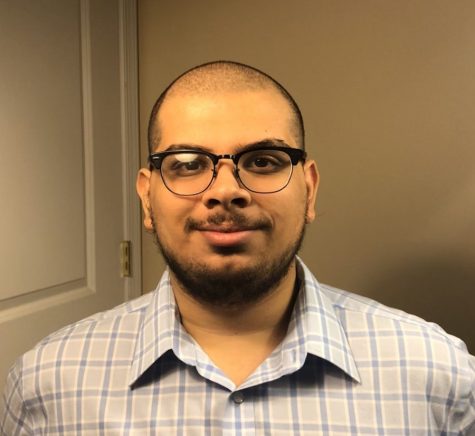In an effort to examine executive immigration policy, dozens of St. John’s Law students gathered for an event sponsored by the Ronald H. Brown Center for Civil Rights and the Coalition for Social Justice.
The Thursday evening at the Mattone Family Atrium at St. John’s Law School began with a traditional set of speakers. Dean Michael Simmons, associate professors Jennifer Baum and Sheldon A. Evans all spoke, followed by a unique speech from 2L student Barbara Irala detailing her work with immigration attorneys.
Some faculty members, administrators and alumni were present but the attending group mostly consisted of law students.
After speeches, students were designated to certain meeting rooms to welcome, share and consider what the program described as “diverse perspectives on family separation, and related government and citizen action.”
These break-out group discussions included insight by present “discussion facilitators” as well as law professors.
Students also discussed experiences with immigration, both within their families and from those they’ve met.
Simons described the idea for a law dialogue regarding social justice emerging immediately after the nationwide reaction to a late-2014 grand jury’s decision to not indict the white Ferguson, Missouri officer Darren Wilson, who had shot unarmed black man, Michael Brown.
According to Simons, the idea had “bubbled up in the law school,” resulting in a dialogue meeting in early 2015.
The Coalition had formed after that meeting and has been a part of the law school community since then.
All three faculty speakers explored the legal policy of the Trump administration’s immigration policy.
Baum highlighted that the separation and detention of children in sub-par detention centers while separated from their families comes from the administration and Justice Department leaving a huge break in procedure.
She went on to explain that the law only dictates that children are to be held for 20 days under certain conditions while they are waiting to reunite with their family at the border for deportation.
Most immigration cases take months or even years with children being stuck in limbo.
Professor Evans goes on to describe what the mentality of migrants are, along with the international community’s criticism of the United States, “this one is intended to sting a little bit: even the Iranian supreme leader, Ayatollah Ali Khamenei, said that this policy was complete maliciousness.”
Evans indicated that the appointment of a new Attorney General (who had immense discretion on US immigration policy) was also largely to blame for the detention of thousands of migrant children.
Irala gave horrific accounts of being an immigration law attorney working in horrific settings because they kept seeing the kids in pain, repeated emphasizing that every case they dealt with was extremely similar.
“I’ve watched seasoned attorneys choke back tears when they talk to these kids. I saw newer attorneys break down,” Irala said.
Irala subsequently explained that many of these children are not told where their parents are and vice versa. In a case that one of her colleagues worked on, she detailed how a government-issued caseworker had told a child that their parent had been deported but that child’s attorney later found her at a detention center awaiting a deportation hearing.
This event was also co-sponsored by the Hugh L. Carey Center for Dispute Resolution, the Latin American Law Students Association, the Public Interest Center, the Immigration Law Society, the International Law Students Association, the Women’s Law Society, the Children’s Law Society, and the Journal of Civil Rights & Economic Development.
—
Correction Oct. 13, 2019: It was incorrectly stated that Irala worked on a case she mentioned about a separated child who was told their parent had been deported. She did not work on said case.










